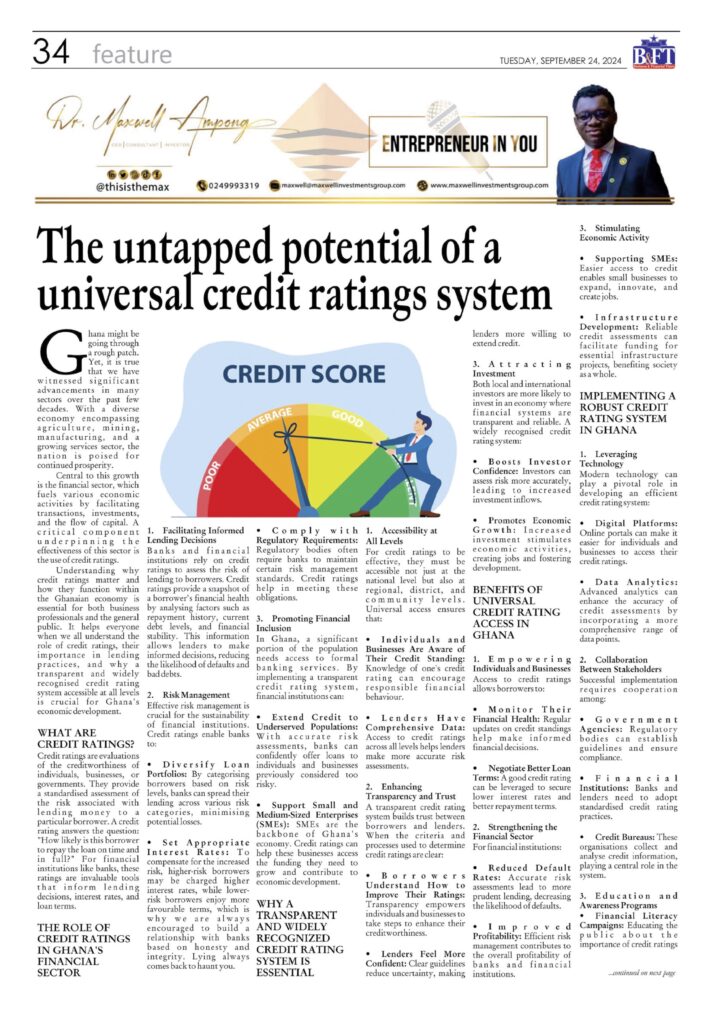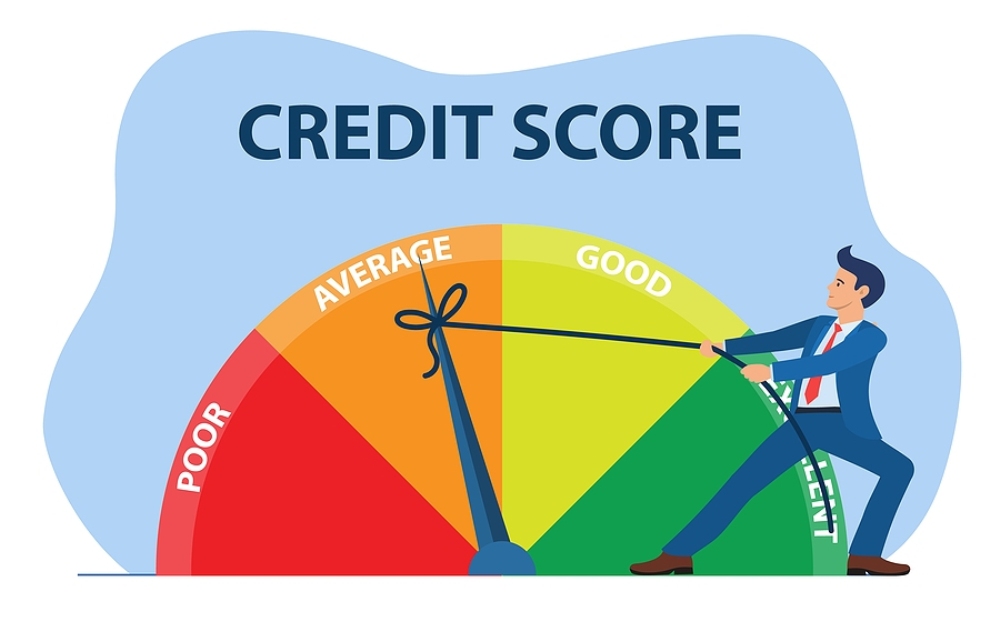
Ghana might be going through a rough patch. Yet, it is true that we have witnessed significant advancements in many sectors over the past few decades. With a diverse economy encompassing agriculture, mining, manufacturing, and a growing services sector, the nation is poised for continued prosperity.
Central to this growth is the financial sector, which fuels various economic activities by facilitating transactions, investments, and the flow of capital. A critical component underpinning the effectiveness of this sector is the use of credit ratings.
Understanding why credit ratings matter and how they function within the Ghanaian economy is essential for both business professionals and the general public. It helps everyone when we all understand the role of credit ratings, their importance in lending practices, and why a transparent and widely recognised credit rating system accessible at all levels is crucial for Ghana’s economic development.
WHAT ARE CREDIT RATINGS?
Credit ratings are evaluations of the creditworthiness of individuals, businesses, or governments. They provide a standardised assessment of the risk associated with lending money to a particular borrower. A credit rating answers the question: “How likely is this borrower to repay the loan on time and in full?” For financial institutions like banks, these ratings are invaluable tools that inform lending decisions, interest rates, and loan terms.
THE ROLE OF CREDIT RATINGS IN GHANA’S FINANCIAL SECTOR
1. Facilitating Informed Lending Decisions
Banks and financial institutions rely on credit ratings to assess the risk of lending to borrowers. Credit ratings provide a snapshot of a borrower’s financial health by analysing factors such as repayment history, current debt levels, and financial stability. This information allows lenders to make informed decisions, reducing the likelihood of defaults and bad debts.
2. Risk Management
Effective risk management is crucial for the sustainability of financial institutions. Credit ratings enable banks to:
- Diversify Loan Portfolios: By categorising borrowers based on risk levels, banks can spread their lending across various risk categories, minimising potential losses.
- Set Appropriate Interest Rates: To compensate for the increased risk, higher-risk borrowers may be charged higher interest rates, while lower-risk borrowers enjoy more favourable terms, which is why we are always encouraged to build a relationship with banks based on honesty and integrity. Lying always comes back to haunt you.
- Comply with Regulatory Requirements: Regulatory bodies often require banks to maintain certain risk management standards. Credit ratings help in meeting these obligations.
3. Promoting Financial Inclusion
In Ghana, a significant portion of the population needs access to formal banking services. By implementing a transparent credit rating system, financial institutions can:
- Extend Credit to Underserved Populations: With accurate risk assessments, banks can confidently offer loans to individuals and businesses previously considered too risky.
- Support Small and Medium-Sized Enterprises (SMEs): SMEs are the backbone of Ghana’s economy. Credit ratings can help these businesses access the funding they need to grow and contribute to economic development.
WHY A TRANSPARENT AND WIDELY RECOGNIZED CREDIT RATING SYSTEM IS ESSENTIAL
1. Accessibility at All Levels
For credit ratings to be effective, they must be accessible not just at the national level but also at regional, district, and community levels. Universal access ensures that:
- Individuals and Businesses Are Aware of Their Credit Standing: Knowledge of one’s credit rating can encourage responsible financial behaviour.
- Lenders Have Comprehensive Data: Access to credit ratings across all levels helps lenders make more accurate risk assessments.
2. Enhancing Transparency and Trust
A transparent credit rating system builds trust between borrowers and lenders. When the criteria and processes used to determine credit ratings are clear:
- Borrowers Understand How to Improve Their Ratings: Transparency empowers individuals and businesses to take steps to enhance their creditworthiness.
- Lenders Feel More Confident: Clear guidelines reduce uncertainty, making lenders more willing to extend credit.
3. Attracting Investment
Both local and international investors are more likely to invest in an economy where financial systems are transparent and reliable. A widely recognised credit rating system:
- Boosts Investor Confidence: Investors can assess risk more accurately, leading to increased investment inflows.
- Promotes Economic Growth: Increased investment stimulates economic activities, creating jobs and fostering development.
BENEFITS OF UNIVERSAL CREDIT RATING ACCESS IN GHANA
1. Empowering Individuals and Businesses
Access to credit ratings allows borrowers to:
- Monitor Their Financial Health: Regular updates on credit standings help make informed financial decisions.
- Negotiate Better Loan Terms: A good credit rating can be leveraged to secure lower interest rates and better repayment terms.
2. Strengthening the Financial Sector
For financial institutions:
- Reduced Default Rates: Accurate risk assessments lead to more prudent lending, decreasing the likelihood of defaults.
- Improved Profitability: Efficient risk management contributes to the overall profitability of banks and financial institutions.
3. Stimulating Economic Activity
- Supporting SMEs: Easier access to credit enables small businesses to expand, innovate, and create jobs.
- Infrastructure Development: Reliable credit assessments can facilitate funding for essential infrastructure projects, benefiting society as a whole.
IMPLEMENTING A ROBUST CREDIT RATING SYSTEM IN GHANA
1. Leveraging Technology
Modern technology can play a pivotal role in developing an efficient credit rating system:
- Digital Platforms: Online portals can make it easier for individuals and businesses to access their credit ratings.
- Data Analytics: Advanced analytics can enhance the accuracy of credit assessments by incorporating a more comprehensive range of data points.
2. Collaboration Between Stakeholders
Successful implementation requires cooperation among:
- Government Agencies: Regulatory bodies can establish guidelines and ensure compliance.
- Financial Institutions: Banks and lenders need to adopt standardised credit rating practices.
- Credit Bureaus: These organisations collect and analyse credit information, playing a central role in the system.
3. Education and Awareness Programs
- Financial Literacy Campaigns: Educating the public about the importance of credit ratings can encourage responsible borrowing and repayment habits.
- Workshops and Seminars: For businesses, especially SMEs, training sessions can provide insights into how credit ratings affect their operations.
CHALLENGES AND CONSIDERATIONS
1. Data Privacy Concerns
- Protecting Sensitive Information: Safeguards must be in place to ensure that personal and financial data are secure.
- Regulatory Compliance: Adherence to data protection laws is essential.
2. Inclusivity
- Reaching Rural Areas: Efforts should be made to ensure that people in remote locations can access credit rating services.
- Accounting for Informal Economies: Many Ghanaians operate outside the formal financial system. Strategies are needed to assess the creditworthiness of these individuals. Easier said than done, I know!
3. Standardisation
- Uniform Criteria: Establishing consistent criteria for credit assessments ensures fairness and reliability.
- Regular Updates: Credit ratings should be updated regularly to reflect current financial circumstances.
NEXT STEPS
Credit ratings are a cornerstone of a robust financial system. In the Ghanaian context, they hold the potential to transform the economy by promoting financial inclusion, enhancing risk management, and attracting investment. By implementing a transparent and widely recognised credit rating system accessible at all levels, Ghana can unlock new opportunities for growth and development. This initiative requires a collective effort from government agencies, financial institutions, and the public. With the right strategies in place, credit ratings can serve as a powerful tool in building a prosperous and financially inclusive Ghana.
I hope you found this article insightful and enjoyable. Subscribe to the ‘Entrepreneur In You’ newsletter here: https://lnkd.in/d-hgCVPy.
I wish you a highly productive and successful week ahead!
♕ —- ♕ —- ♕ —- ♕ —- ♕
Disclaimer: The views, thoughts, and opinions expressed in this article are solely those of the author, Dr. Maxwell Ampong, and do not necessarily reflect the official policy, position, or beliefs of Maxwell Investments Group or any of its affiliates. Any references to policy or regulation reflect the author’s interpretation and are not intended to represent the formal stance of Maxwell Investments Group. This content is provided for informational purposes only and does not constitute legal, financial, or investment advice. Readers should seek independent advice before making any decisions based on this material. Maxwell Investments Group assumes no responsibility or liability for any errors or omissions in the content or for any actions taken based on the information provided.


